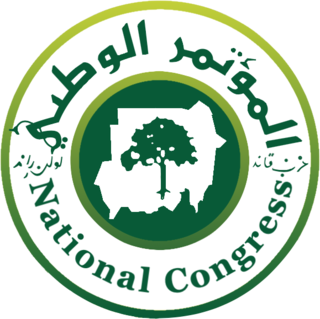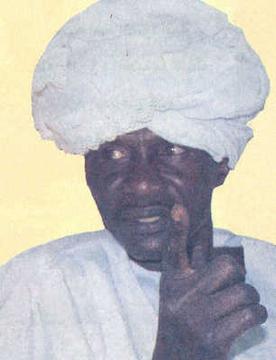Related Research Articles

Omar Hassan Ahmad al-Bashir is a Sudanese former military officer and politician who served as the seventh head of state of Sudan under various titles from 1989 until 2019, when he was deposed in a coup d'état. He was subsequently incarcerated, tried and convicted on multiple corruption charges. He came to power in 1989 when, as a brigadier general in the Sudanese Army, he led a group of officers in a military coup that ousted the democratically elected government of prime minister Sadiq al-Mahdi after it began negotiations with rebels in the south; he subsequently replaced President Ahmed al-Mirghani as head of state. He was elected three times as president in elections that have been under scrutiny for electoral fraud. In 1992, al-Bashir founded the National Congress Party, which remained the dominant political party in the country until 2019. In March 2009, al-Bashir became the first sitting head of state to be indicted by the International Criminal Court (ICC), for allegedly directing a campaign of mass killing, rape, and pillage against civilians in Darfur. On 11 February 2020, the Sudanese government announced that it had agreed to hand over al-Bashir to the ICC for trial.

The Justice and Equality Movement is an opposition group in Sudan founded by Khalil Ibrahim. Gibril Ibrahim has led the group since January 2012 after the death of Khalil, his brother, in December 2011. JEM's political agenda includes issues such as: radical and comprehensive constitutional reform to grant Sudan's regions a greater share of power in ruling the country, the replacement of social injustice and political tyranny with justice and equality, and basic services for every Sudanese.

The National Congress Party was a major political party that dominated domestic politics in Sudan from its foundation until the Sudanese Revolution.

The African Union Mission in Sudan (AMIS) was an African Union (AU) peacekeeping force operating primarily in the country's western region of Darfur to perform peacekeeping operations related to the Darfur conflict. It was founded in 2004, with a force of 150 troops. By mid-2005, its numbers were increased to about 7,000. Under United Nations Security Council Resolution 1564, AMIS was to "closely and continuously liaise and coordinate ... at all levels" its work with the United Nations Mission in Sudan (UNMIS). AMIS was the only external military force in Sudan's Darfur region until UNAMID was established. It was not able to effectively contain the violence in Darfur. A more sizable, better equipped UN peacekeeping force was originally proposed for September 2006, but due to Sudanese government opposition, it was not implemented at that time. AMIS' mandate was extended repeatedly throughout 2006, while the situation in Darfur continued to escalate, until AMIS was replaced by UNAMID on 31 December 2007.

The International Criminal Court has opened investigations in Afghanistan, the Central African Republic, Côte d'Ivoire, Darfur in Sudan, the Democratic Republic of the Congo, Kenya, Libya, Uganda, Bangladesh/Myanmar, Palestine, the Philippines, and Venezuela. Additionally, the Office of the Prosecutor conducted preliminary examinations in situations in Bolivia, Colombia, Guinea, Iraq / the United Kingdom, Nigeria, Georgia, Honduras, South Korea, Ukraine and Venezuela. Preliminary investigations were closed in Gabon; Honduras; registered vessels of Comoros, Greece, and Cambodia; South Korea; and Colombia on events since 1 July 2002.

The War in Darfur, also nicknamed the Land Cruiser War, was a major armed conflict in the Darfur region of Sudan that began in February 2003 when the Sudan Liberation Movement (SLM) and the Justice and Equality Movement (JEM) rebel groups began fighting against the government of Sudan, which they accused of oppressing Darfur's non-Arab population. The government responded to attacks by carrying out a campaign of ethnic cleansing against Darfur's non-Arabs. This resulted in the death of hundreds of thousands of civilians and the indictment of Sudan's president, Omar al-Bashir, for genocide, war crimes, and crimes against humanity by the International Criminal Court.

United Nations Security Council Resolution 1593, adopted on 31 March 2005, after receiving a report by the International Commission of Inquiry on Darfur, the Council referred the situation in the Darfur region of Sudan to the International Criminal Court (ICC) and required Sudan to co-operate fully. It marked the first time the council had referred a situation to the court, and also compelled a country to co-operate with it.
Ahmed Mohammed Haroun is one of five Sudanese men wanted by the International Criminal Court (ICC) for war crimes and crimes against humanity in Darfur. Despite international pressure on the government of Sudan to surrender him to the ICC, Haroun served as Sudan's Minister of State for Humanitarian Affairs until May 2009, when he was appointed to the governorship of South Kordofan. In September 2007, he was appointed to lead an investigation into human rights violations in Darfur. In July 2013 he resigned as Governor of South Kordofan, and was reappointed by Omar al-Bashir as Governor of North Kordofan. On 1 March 2019, President Omar al-Bashir handed over the running of the country's leading political party, the National Congress, to him. He was arrested in April 2019 by local authorities in Sudan following a coup which overthrew al-Bashir.

Ali Muhammad Ali Abd-Al-Rahman, commonly known as Ali Kushayb, is a senior Janjaweed commander who supported the Sudanese government against Darfur rebel groups during the Omar al-Bashir presidency. He was indicted by the International Criminal Court (ICC) for war crimes. He was known as aqid al oqada and was active in Wadi Salih, West Darfur.

The raids on Haskanita were a series of attacks on African Union peacekeepers by rebel groups during the Darfur conflict. The attacks took place on 30 September and early October 2007 near the town of Haskanita in South Darfur. Three rebel commanders were arrested for the attacks on warrants issued by the International Criminal Court.
Abdul Wahid Mohamed al Nur is the leader of the rebel Sudan Liberation Movement faction.
Bahr Idriss Abu Garda is the leader of the United Resistance Front, a rebel group fighting against the Sudanese government in Darfur. He is a former commander of the Justice and Equality Movement.

Luis Moreno Ocampo is an Argentine lawyer who served as the first Prosecutor of the International Criminal Court (ICC) from 2003 to 2012. Previously, he had played a major role in Argentina's democratic transition (1983–1991).
Abdallah Banda Abakaer Nourain, commonly referred to as Abdallah Banda, was the Commander-in-Chief of the Justice and Equality Movement (JEM) Collective-Leadership, one of the components of the United Resistance Front. As of June 2019, he is wanted for trial before the International Criminal Court for three counts of war crimes allegedly committed during the Haskanita raids against African Union peacekeepers within the context of the Darfur conflict in Sudan.

Joyce Aluoch is a Kenyan lawyer who served as Judge of the International Criminal Court from 2009 until 2018. She is a former judge of the High Court of Kenya. In addition to her career as a judge, she was the First Chairperson of the Committee of African Union Experts on the Rights and Welfare of the Child and the Vice-Chairperson of the United Nations Committee on the Rights of the Child from 2003 to 2009. She has also served as the inaugural head of the family division of the Kenyan High Court and a member of the Court of Appeal.

The International Criminal Court investigation in Darfur or the situation in Darfur is an ongoing investigation by the International Criminal Court (ICC) into criminal acts committed during the War in Darfur. Although Sudan is not a state party to the Rome Statute, the treaty which created the ICC, the situation in Darfur was referred to the ICC's Prosecutor by the United Nations Security Council in 2005. As of June 2019, five suspects remained under indictment by the court: Ahmed Haroun, Ali Kushayb, Omar al-Bashir, Abdallah Banda and Abdel Rahim Mohammed Hussein. Charges against Bahar Abu Garda were dropped on the basis of insufficient evidence in 2010 and those against Saleh Jerbo were dropped following his death in 2013. In mid-April 2019, Haroun, al-Bashir and Hussein were imprisoned in Sudan as a result of the 2019 Sudanese coup d'état. In early November 2019, the Forces of Freedom and Change (FFC) and Sudanese Prime Minister Abdalla Hamdok stated that al-Bashir would be transferred to the ICC. One of the demands of the displaced people of Darfur visited by Hamdok prior to Hamdok's statement was that "Omar Al Bashir and the other wanted persons" had to be surrendered to the ICC.

The Darfur genocide is the systematic killing of ethnic Darfuri people which has occurred during the ongoing conflict in western Sudan. It has become known as the first genocide of the 21st century. The genocide, which is being carried out against the Fur, Masalit and Zaghawa ethnic groups, has led the International Criminal Court (ICC) to indict several people for crimes against humanity, rape, forced transfer and torture. An estimated 200,000 people were killed between 2003 and 2005.

The 2019–2022 Sudanese protests were street protests in Sudan which began in mid-September 2019, during Sudan's transition to democracy, about issues which included the nomination of a new Chief Justice and Attorney General, the killing of civilians by the Rapid Support Forces (RSF), the toxic effects of cyanide and mercury from gold mining in Northern state and South Kordofan, opposition to a state governor in el-Gadarif and to show trials of Sudanese Professionals Association (SPA) coordinators, and advocating the dismissal of previous-government officials in Red Sea, White Nile, and South Darfur. The protests follow the Sudanese Revolution's street protests and civil disobedience of the early September 2019 transfer of executive power to the country's Sovereignty Council, civilian prime minister Abdalla Hamdok, and his cabinet of ministers. Hamdok described the 39-month transition period as defined by the aims of the revolution.
The Sudanese National Human Rights Commission has been headed by Hurriya Ismail, appointed by former president Omar al-Bashir, since March 2018 or earlier and continued under her leadership during the 2019 Sudanese transition to democracy.
References
- 1 2 "Situation in Darfur, Sudan in the case of The Prosecutor v. Abdallah Band Abakaer Nourain and Saleh Mohammed Jerbo Jamus" (PDF). International Criminal Court. 2013-10-04. Archived (PDF) from the original on 2019-06-08. Retrieved 2019-06-09.
- ↑ ICC Case Information Sheet on the Banda and Jerbo proceedings Archived 2011-10-28 at the Wayback Machine . Retrieved 6 July 2011.
- ↑ "ICC suspect, JEM-Bashar deputy presumably killed in Darfur". Radio Dabanga. 2013-04-22. Archived from the original on 2013-04-24. Retrieved 2013-04-23.